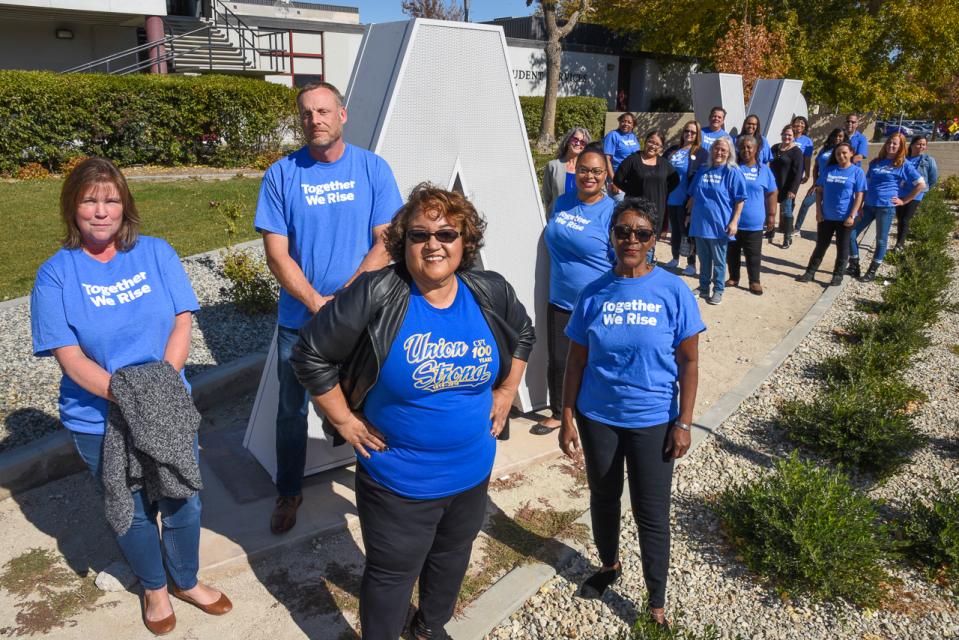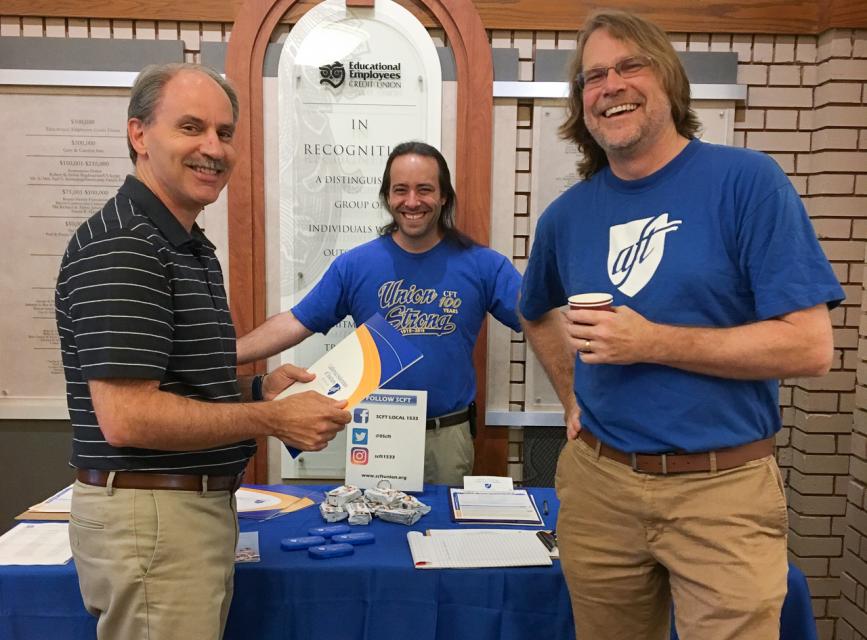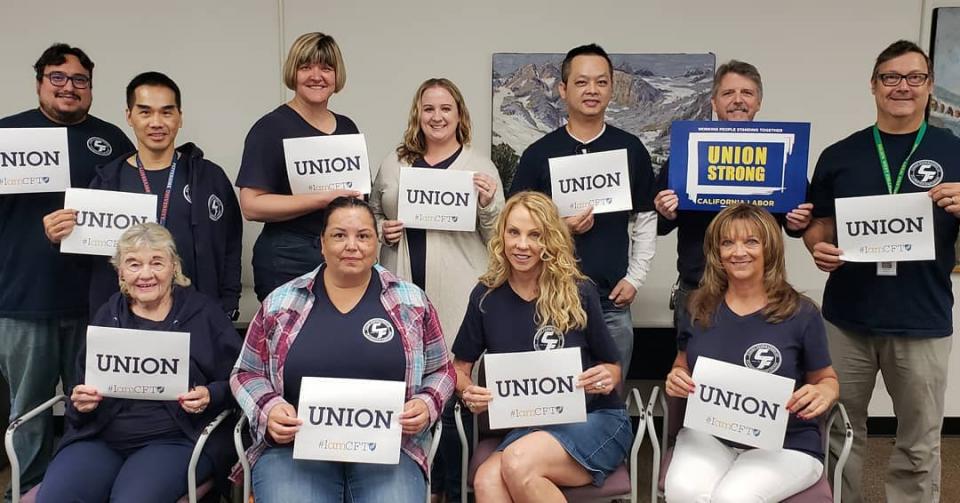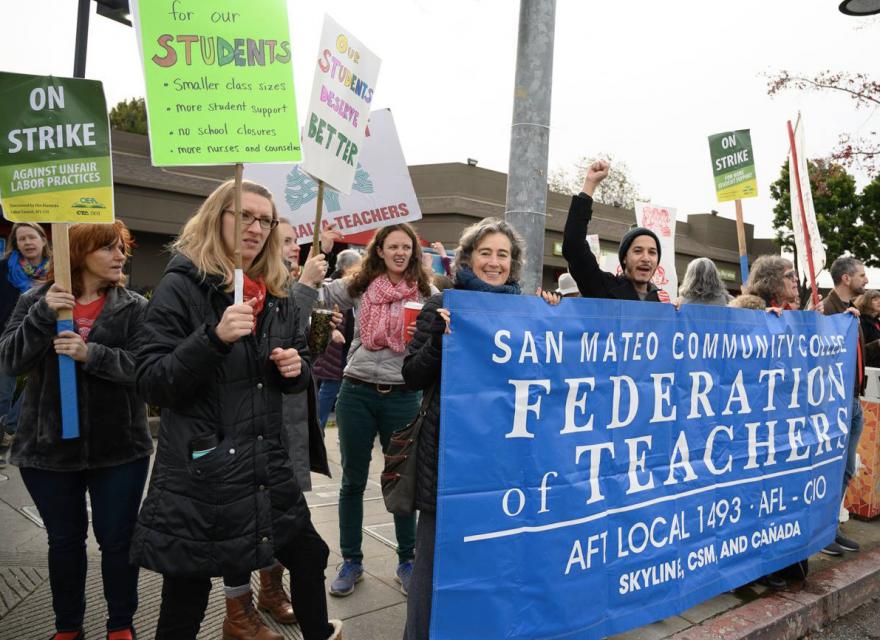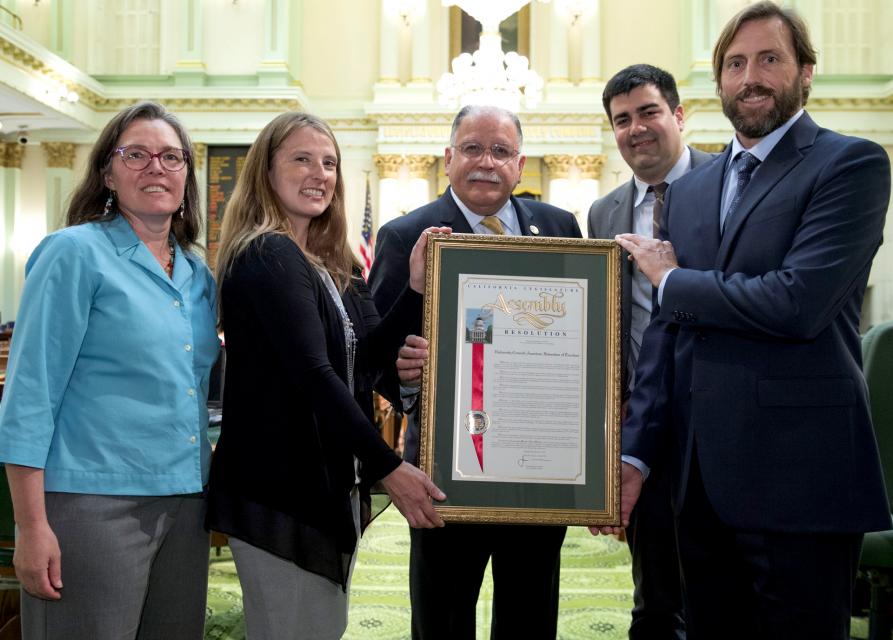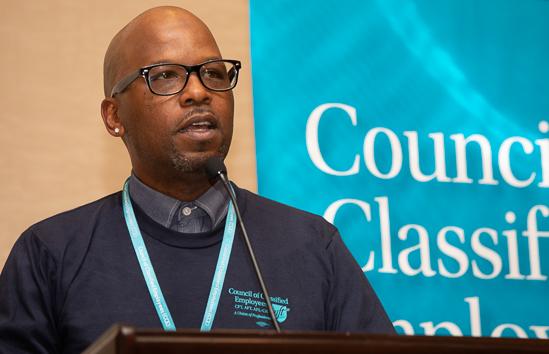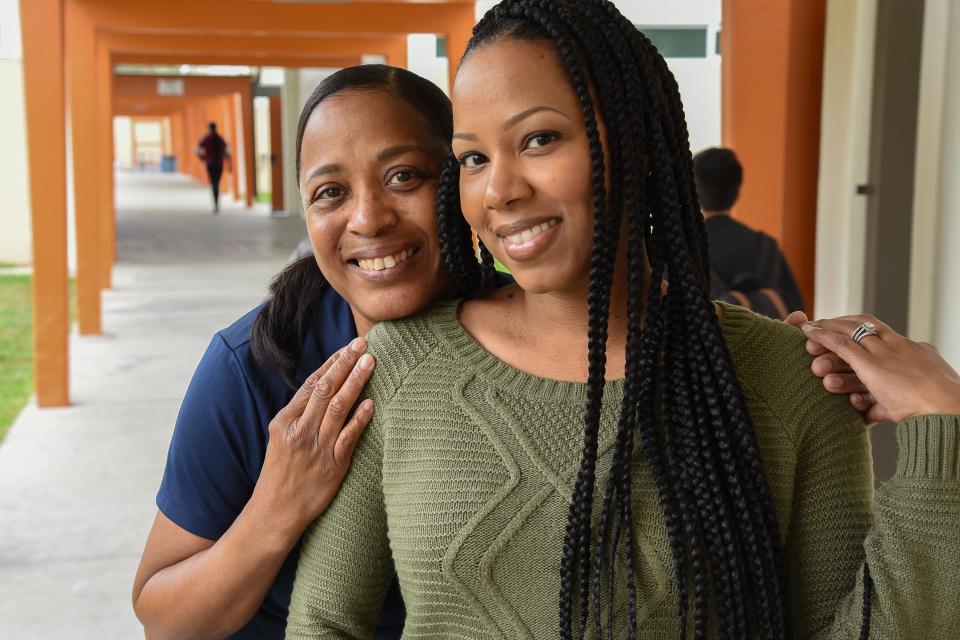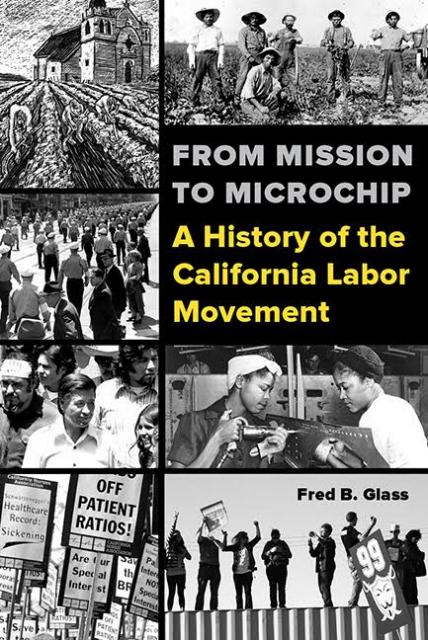UC lecturers’ victory inspires broad movement for equity across higher education
CFT wages a campaign for part-time faculty in the community colleges
By Jeffery M. Freitas, CFT President
For about three years the University Council-AFT engaged in protracted negotiations on behalf of lecturers in their unit. Their aims have always been about fairness — better working conditions for lecturers and improved learning conditions for students. Their fight has been about not only winning economic and contractual gains for members, but gaining professional respect and recognition for their teaching at the University of California. Their campaign has been a true member-driven effort, rooted in years of organizing by the statewide local that represents both continuing lecturers and librarians, led by their president, Mia McIver, and a committed negotiations team.
State Supreme Court victory brings back pay with interest to Antelope Valley College staff
Local wins fives years of back pay with interest for overtime imposed by anti-union administration
It took more than five years and reached all the way to the California Supreme Court, but the Antelope Valley College Federation of Classified Employees has knocked a toxic administration on its heels.
“Justice moves slowly, but the fight to protect collective bargaining rights is always worth it,” said AFT Local 4683 President Pamela Ford.
Part-timer takes the helm at State Center Federation of Teachers
One of the great powers of a union is its ability to uplift the living conditions and status of its members, not just at the bargaining table, but within the structure of the union itself — when the seemingly most marginalized members assume leadership roles.
In local unions representing all faculty, there has been a recent trend of the membership electing a part-time faculty member to lead the union, with significant support from the full-timers. There is perhaps no better example of this, though he might be reluctant himself to say so, than Keith Ford.
Unions weather the storm and look to build a brighter future
Happy Labor Day 2019
FIRST PERSON | Jim Miller
These last few years have been particularly challenging times for the American labor movement as we’ve faced everything from a host of anti-labor policies coming from Washington to a Supreme Court decision designed to gut public sector unions. The good news is that despite all of that, the union movement has persevered and the number of Americans who support unions and say they would like the opportunity to join one is the highest it has been in decades.
Horns & Warm Kleenex: A personal view of the Oakland teachers’ strike
FIRST PERSON | By Katharine Harer
I joined the picket lines in Oakland on three different mornings. On the first day of the strike, teachers brought a boom box and we danced and sang on the line. Another day, at a different school, a parent brought a folding table and fed us tangerines, string cheese, mountains of cinnamon and chocolate croissants and hot coffee.
UC-AFT recognized on Assembly Floor
Assemblyman Jose Medina, D-Riverside, Chair of the Higher Education Committee, recognized the University Council-AFT on the Assembly Floor during UC-AFT’s first group lobby day at the State Capitol on April 1.
We need you… to become a Unionist
Editor’s note: What follows is a condensed version of an inspired presentation from the CFT’s annual Classified Conference.
My name is Carl Williams and I am southern vice president of the CFT Council of Classified Employees, a CFT vice president, proud president of the Lawndale Federation of Classified Employees, a father, a husband… and a Unionist. Now don’t get me wrong, I have not always been a Unionist… the transition from union member is not instantaneous.
One job should be enough! Classified conference-goers unite with hotel workers
“Good morning, San Francisco!” Luukia Smith called out to a sea of striking Marriott hotel workers and their supporters. Among the crowd were CFT classified employees who had bussed from the Classified Conference on October 20 to join the downtown rally.
It’s a family affair: When parents and children are union brothers and sisters
“Working for a small district has its pros and cons,” said Carl Williams, “but it’s mostly pros.”
Williams is president of AFT Local 4529, the Lawndale Federation of Classified Employees. The federation represents about 450 staff in the Lawndale district’s six elementary and two middle schools.
Lessons for Labor Day 2018: Solidarity works!
By Jim Miller
It has been the worst of times and the best of times for the American Labor Movement in 2018.
Economic inequality has continued to spiral out of control as policy coming out of Washington, D.C. designed to tilt the scales in favor of the rich and corporations weakened the rights of working Americans at every turn. At the Supreme Court level, anti-labor justices joined the assault against labor and undermined public sector unions’ rights to collect dues. This, combined with a tax bill that radically redistributed wealth upward and paved the way for new austerity measures aimed at gutting Social Security and Medicare, had some pundits sounding the death knell for unions and the legacy of the New Deal.
Documentary movie features United Farm Workers organizer
Five lessons from Dolores Huerta
Dolores Huerta, an organizing legend who co-founded the United Farm Workers with Cesar Chavez, was a Girl Scout growing up in Stockton. She took seriously the idea that people should help one another and try to make things better. Something that particularly angered her was police officers stopping her and her Latino friends — but not the white people they knew — on their way home from a basketball or football game.
New book illustrates the humanity of people who travel with the crops
Writer, photographer and veteran UFW union organizer David Bacon frequently refers to “people who travel with the crops,” agricultural workers who move from place to place to cultivate and harvest California’s fields. They are the subject of his newest work of photojournalism, In the Fields of the North/En los campos del norte. Bacon is a frequent contributor to California Teacher. Below are excerpts from an interview with Capitol & Main. » Read the whole article here.
Victory in Watsonville: Cannery workers show how solidarity works
KNOW OUR HISTORY
Watsonville, California, a produce powerhouse — July 1985: Mort Console, owner of Watsonville Canning, the major company in town, suddenly cuts wages by 40 percent and reduces health benefits. The factory workers of Teamsters Local 912 immediately vote to go out on strike, just as Console’s anti-union law firm has advised him they would: “Make outrageous demands; the workers will strike. Replace them with scabs. After 12 months, request a union decertification vote, which will then include the strikebreakers too.”
Book review: From Mission to Microchip, A History of the California Labor Movement
Working people have been organizing in California since the 18th century. And, as Utah Phillips says, we workers do not get benevolent gifts from enlightened management.
Nine killed in Mexico fighting punitive education reform
Government turns to violence, refuses to negotiate
Since the killing of nine demonstrators in the Oaxacan town of Nochixtlán on June 19, Mexico has been in an uproar over the force used against teachers resisting corporate education reform. As the school year started on August 22, teachers in four states refused to return to classes until the perpetrators of the massacre are held responsible and there is a negotiated agreement to change the government’s program.
Women leaders bring powerful traits to union work
How the female perspective helps new local presidents succeed
Five women spoke to California Teacher about their first months as new presidents of AFT local unions. These leaders relate how their perspective as women shapes their approach to the challenges unions face.
Honoring “letter carrier who sings” turned teacher
Old school troubadour and modern Joe Hill among top labor artists and activists
Jimmy Kelly comes from a union family in Pittsburgh, Pennsylvania, where his grandfather, father and two brothers were all union members. “I grew up in a different era, in a town that traced the origin of its labor movement to the great strikes in the steel mills,” he recalls. “We learned labor terms in fourth grade.”
Workers’ Rights Boards: Making a difference in the lives of educators
PETALUMA
Over the past few months, teachers in two California cities have
looked to a new labor-community institution to help resolve
seemingly intractable problems in negotiations.
Electrical workers unleash organizing stewards for social justice
How does a new PG&E worker like Nilda Garcia become an organizer traveling the nation to fight for social justice? Garcia is one of a group of “organizing stewards” that has ignited passion in her union, the International Brotherhood of Electrical Workers, Local 1245.
CFT boycotts Staples to save postal worker jobs
Union asks members not to purchase supplies at low-wage retailer
The CFT is boycotting office supply retailer Staples at the request of the American Postal Workers Union, which is opposing a no-bid sweetheart deal between the U.S. Postal Service and the giant office supply retailer to operate postal counters in Staples stores. An estimated one-third of Staples’ revenues come from the sale of school supplies, many purchased by teachers and other school employees for classrooms.
Domestic Worker Bill of Rights corrects historic wrongs
Seven-year journey to bring overtime protections to personal attendants
They work in the shadows of society and have been excluded from the most basic of labor protections. Yet those domestic workers who care for seniors, children and the disabled, have risen above their historic isolation, built an effective coalition and performed the seven years of heavy lifting that saw their struggle succeed.
Lessons from Latin America: Reclaiming public education requires powerful fight back
By Joshua Pechthalt, CFT President
The CFT’s emerging campaign for quality public education underscores the fundamental problem we face in this country — the lack of a powerful social movement for economic, political and social equality.
When workers stand together, we can win!
By Velma J. Butler, President, CFT Council of Classified Employees
I spent the day after Thanksgiving with family and friends at Walmart. We weren’t in front of the largest — and richest — retailer in the world for Black Friday sales. We were there to support employees standing up for what every worker wants: dignity and respect on the job.
Walmart’s formula for “success” is no secret. They offer cheap prices by paying suppliers around the world like dirt, paying their 1.4 million employees like dirt, and driving smaller competitors out of business. If other “big box” stores try to play by the same rules, it touches off a race to the bottom that spreads the pain.
Get Connected
Organizations and campaigns advocating for contingent faculty
NATIONAL AND INTERNATIONAL
Coalition of Contingent Academic Labor (COCAL ) An integrated coalition of activists from faculty organizations and unions representing contingent, non-tenured faculty members in all segments of higher education in North-America, with the goals of coordinating activities to educate the public about the inequities of contingent faculty, promoting legislation, and improving bargaining rights, working conditions and education standards.
What labor lost and won in Wisconsin
By Velma J. Butler, President, CFT Council of Classified Employees
There is no denying or candy-coating it: Wisconsin Gov. Scott Walker was not recalled in the June 5 special election. Progressive voters led by public sector employees fell short of that goal, beaten in large part by a 7-1 flood of anti-union money.


